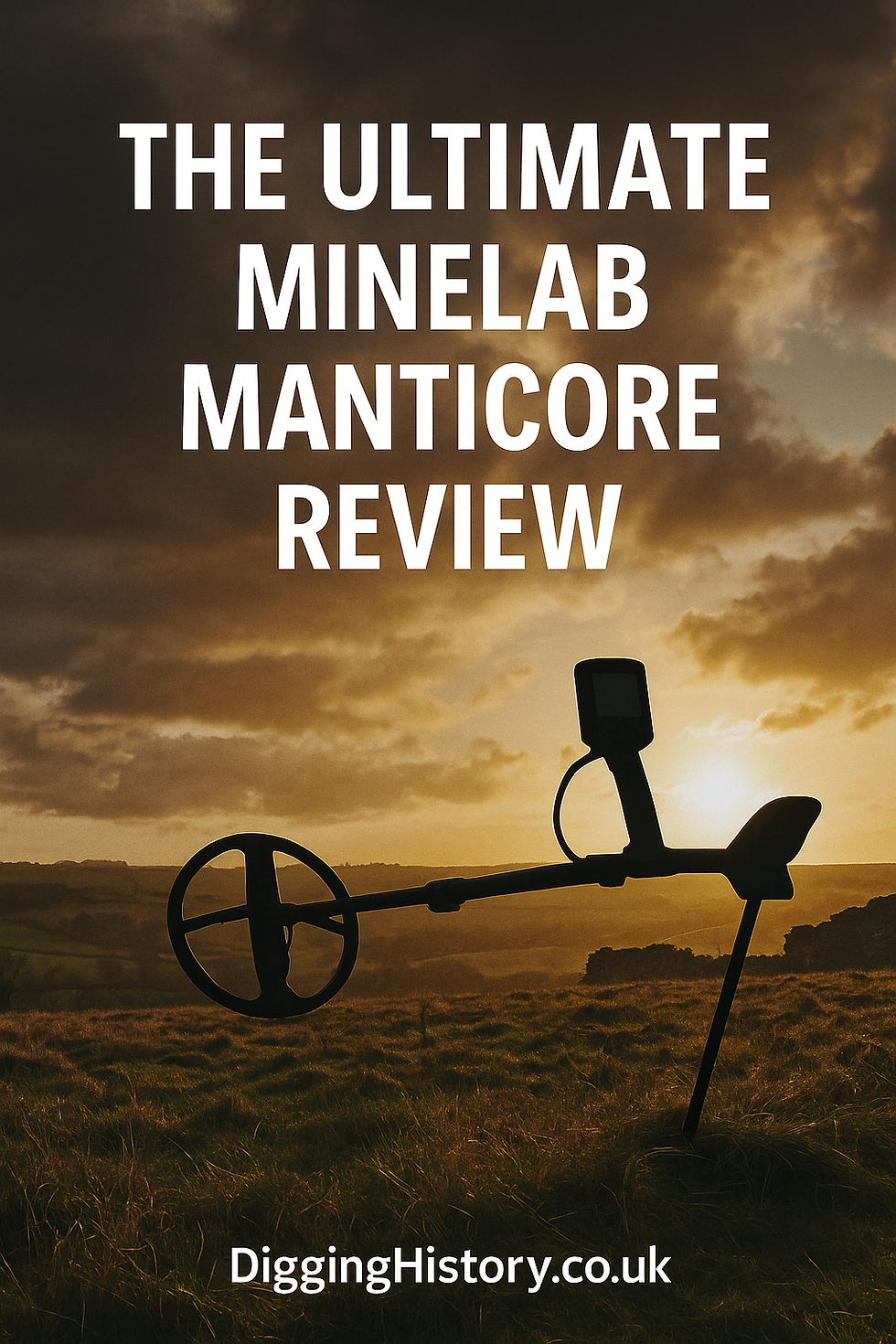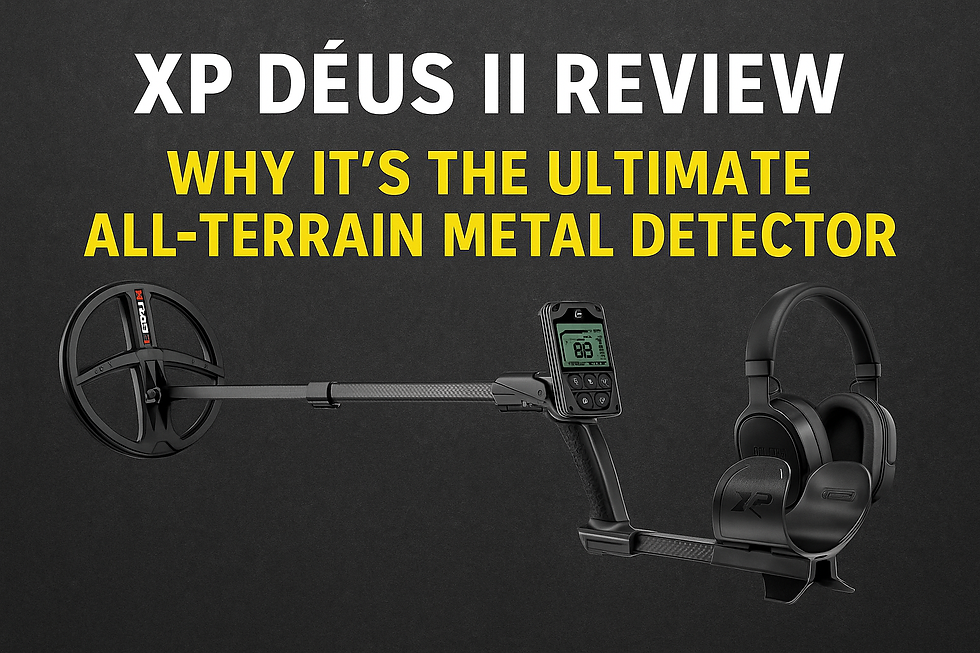The Surprisingly Brilliant Benefits of Metal Detecting: Why Swinging a Coil Might Change Your Life
- DiggingHistory.co.uk
- Sep 30
- 7 min read
More Than Just Shiny Things
If you’ve ever spotted someone wandering around a windswept beach, headphones on, sweeping a peculiar contraption back and forth, you may have thought: “What on earth are they doing? Have they lost their car keys… again?” Chances are, they’re metal detecting — and far from being eccentric beach ornaments, these detectorists are enjoying one of the most unexpectedly beneficial hobbies around.
Metal detecting in the UK isn’t just about unearthing old coins, rusty nails, or the occasional ring dropped by someone who overestimated their finger size. It’s a hobby that improves your health, boosts your social life, connects you with history, reduces stress, and can even help the planet. Yes, really.
So, if you’ve ever wondered whether to give it a go, here are the many benefits of metal detecting that might just persuade you to grab a detector and join the ranks of Britain’s happiest treasure hunters.

Health Benefits of Metal Detecting
A Gym Membership Without the Lycra
Metal detecting involves a surprising amount of walking. You’ll cover fields, forests, beaches, and maybe even the occasional cow-occupied meadow (don’t worry, they’re usually friendly).According to fitness trackers, a solid detecting session can clock up 10,000–20,000 steps without you even noticing, because your mind is occupied with thoughts like “Is this a Roman coin or just another ring pull?”
Unlike the gym, there’s no intimidating equipment, no waiting in line for a treadmill, and no risk of making eye contact with a sweaty stranger while attempting squats. Metal detecting is exercise in its purest, most enjoyable form.
Fresh Air Therapy
In an age when many of us are glued to screens, metal detecting practically forces you outdoors. Whether it’s the bracing sea breeze at Whitby, the rolling hills of the Cotswolds, or a quiet patch of woodland in Kent, you’ll soak up Vitamin D, breathe cleaner air, and probably return home with rosy cheeks and muddy boots.
Science agrees: spending time outside improves mood, boosts the immune system, and lowers blood pressure. Or as detectorists call it, “Tuesday”.
Strength Training for the Everyday Adventurer
You might not notice it at first, but swinging a metal detector, carrying gear, and digging (responsibly) gives your muscles a decent workout. Core strength, arms, shoulders, and legs all get involved. It’s basically functional fitness but instead of lifting a kettlebell, you’re unearthing a medieval buckle or an aluminium drinks can from 1987. Both valuable in their own way.
Mental Wellbeing and Mindfulness

Zen and the Art of Coil Swinging
Metal detecting is the ultimate mindfulness practice. The repetitive, rhythmic sweep of the detector, the anticipation of a signal, the focus on the ground, it all draws you into the present moment. Stress about work deadlines, bills, or whether your neighbour borrowed your lawnmower fades away.
Detectorists often report a meditative calm. It’s a hobby where your mind is both engaged and relaxed, tuned to the here and now, which is far more effective than scrolling TikTok at 1 a.m.
The Thrill of Discovery
Humans are hardwired to enjoy finding things. Our ancestors hunted mammoths; today, we hunt hammered coins. That little “beep” in your headphones triggers a rush of dopamine, the brain’s reward chemical. Even if the find turns out to be a rusty bolt, the anticipation is addictive, in the healthiest way possible.
A Cure for the Blues (and the Greys)
Many detectorists swear by the hobby as a natural antidepressant. Winter in the UK can feel endless: grey skies, drizzle, and more drizzle. But give someone a detector and suddenly the weather matters less. Even in the cold, there’s joy in knowing you might uncover a piece of history (or at least a slightly less corroded ring pull).
Social Benefits

Joining the Detectorist Community
Metal detecting can be wonderfully solitary, but it’s also incredibly social. Across the UK, there are countless clubs and groups that welcome newcomers. These aren’t dusty societies with stern rules, they’re filled with friendly enthusiasts eager to share tips, finds, and the occasional flask of tea.
Joining a club means organised digs, access to land permissions, and most importantly camaraderie. Detectorists love swapping stories: “I once found a musket ball the size of a marble!”“That’s nothing — I dug up a whole hoard of pre-decimal coins behind a Tesco car park!”
Age Is Just a Number
Metal detecting is one of those rare hobbies where everyone is equal. Whether you’re 18 or 80, it doesn’t matter. The detector does the hard listening, and the ground doesn’t discriminate. It’s not uncommon to see teens detecting alongside retirees, both equally excited over a Victorian halfpenny.
Family Adventures
Want to coax kids off their PlayStations? Hand them a pinpointer and tell them there’s treasure buried in the field. Families who detect together often turn a hobby into weekend adventures, complete with picnics, discoveries, and arguments over who actually gets to keep the coin.
Connecting With History
Time Travel Without the Flux Capacitor
The UK is a historian’s playground. With layers of Roman, Saxon, Viking, medieval, Tudor, and modern history beneath our feet, almost every signal is a time capsule. Imagine holding a coin that last exchanged hands during the reign of Henry VIII, possibly dropped because someone was distracted by his latest marital scandal.
Everyday Artefacts, Extraordinary Stories
Not every find is gold. In fact, most aren’t. But even humble objects, a 17th-century button, a Georgian shoe buckle, a Victorian thimble tell stories of everyday lives long gone. These finds bridge the gap between “big history” and real people who lived, worked, and lost things just like we do today.
The Treasure Act and Reporting Finds
One uniquely British aspect of detecting is the legal framework. The Treasure Act 1996 ensures significant finds are reported, preserved, and often displayed in local museums. That means your discovery could end up in a glass case, admired by schoolchildren on trips, with your name proudly listed as the finder.
Environmental Benefits
Cleaning Up the Countryside
Detectorists often remove vast amounts of modern junk from fields and beaches: cans, nails, foil, bottle tops. While these might be disappointing finds in the moment, they contribute to cleaning up the environment. Many detectorists leave an area tidier than they found it.
Recycling With a Historical Twist
Every dug item, whether ancient or modern, is a form of recycling. Instead of rusting away unseen, it’s given new life: studied, displayed, or even sold as scrap metal. It’s eco-friendly treasure hunting.
Financial Benefits
The Myth of Instant Riches
Let’s be honest: most detectorists won’t stumble upon a hoard worth millions. But modest finds, silver coins, jewellery, relics can be surprisingly valuable. Selling duplicates or unwanted items can fund better equipment, new boots, or the petrol for your next detecting trip.
The Big Finds Do Happen
That said, hoards and treasures are very real. From the Staffordshire Hoard to Viking silver caches, everyday people with detectors have stumbled upon extraordinary riches. While it’s rare, the possibility alone keeps many detectorists dreaming and digging.
Skills You’ll Develop
Patience of a Saint
Metal detecting isn’t instant gratification. For every coin, you’ll dig countless bits of rubbish. But with persistence comes reward. Detectorists become masters of patience, a skill that transfers to everyday life (and to dealing with the Wi-Fi dropping out again).
Research and Curiosity
Successful detecting often involves research: studying old maps, field boundaries, and historical records. You’ll learn more about your local area than you ever did at school. Who knew that quiet field near your village once hosted a medieval fair?
Respect for the Land
Metal detecting instils a deep respect for the countryside. Responsible detectorists follow the Code of Practice for Responsible Metal Detecting, fill their holes, and always seek permission. It fosters a positive relationship with farmers and landowners.
Humour in the Hobby

Expect the Unexpected
Metal detecting is filled with comic moments. There’s the excitement of digging a deep, promising signal… only to find a Coke can. The way detectorists can look like they’re performing a strange dance across a field. Or the fact that, nine times out of ten, your “rare relic” turns out to be an old bolt.
Detectorists’ Worst Enemies
Every hobby has its frustrations. For detectorists, it’s cow pats, nettles, brambles, seagulls, and the bloke who insists you’ve definitely just found a UFO fragment. (Spoiler: you haven’t.)
Detectorist Fashion
Forget designer brands. The true detectorist look is waterproof trousers, muddy boots, a sunhat that looks like it’s seen action in the Sahara, and a bumbag. It’s practical, it’s rugged, and it absolutely will not appear on the cover of Vogue.
Getting Started
You don’t need to remortgage your house to get started. Entry-level detectors can be affordable, easy to use, and surprisingly effective. As you progress, you might upgrade to models with fancy features like ground balancing, multi-frequency detection, or a setting that filters out bottle caps (a dream come true).
Where to Detect in the UK
Popular spots include:
Beaches – great for modern jewellery and coins.
Fields (with permission) – ideal for historical finds.
Woods and pathways – good for lost items across the ages.
Your own back garden – you’d be amazed what turns up.
Etiquette and Permissions
Always ask landowners before detecting on private land. Beaches are often fine, but check local regulations. And remember: fill in your holes, respect the countryside, and follow the law.
Why Metal Detecting Is the Hobby Britain Needs
In a world obsessed with screens, stress, and endless busyness, metal detecting offers something rare: simplicity, excitement, community, and genuine joy. It’s good for your body, your brain, your friendships, and even the planet.
Yes, you might spend three hours digging up ring pulls and nails. But the day you find a Roman coin, a lost wedding ring, or a relic that connects you to the past, you’ll understand why detectorists call this hobby the best thing since sliced bread (which, by the way, you might also find a vintage tin of).
So, whether you’re in it for fitness, friendship, history, or the sheer thrill of discovery, grab a detector and start sweeping. Who knows? The next beep could change your day or even your life.
Benefits That Go Beyond Treasure
Metal detecting is more than just a quirky pastime. It’s exercise, meditation, history, community, and comedy rolled into one muddy, thrilling, endlessly rewarding package. And the best part? It’s open to everyone.
So the next time someone raises an eyebrow at your strange new hobby, just smile and say: “It keeps me fit, makes me happy, connects me with history, and saves the planet, what’s your hobby again?”
Then wander off into the sunset, detector in hand, ready for your next adventure.
✨ Thanks for reading! If you enjoyed this article, please share it with friends, fellow hobbyists, or anyone who might secretly love the idea of finding buried treasure.





Comments